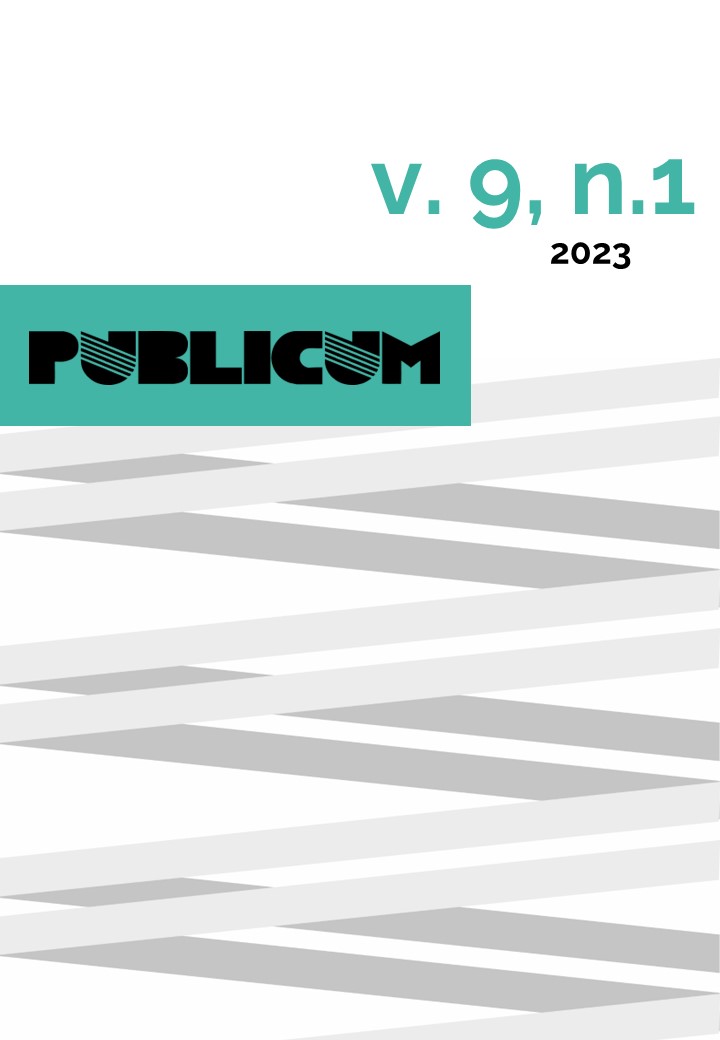Crucial cases and decisional variables from the Federal Supreme Court
DOI:
https://doi.org/10.12957/publicum.2023.80967Keywords:
Judicial review, Political philosophy, Politics, Public opinion, Supreme Federal Court of BrazilAbstract
There are possible decisional variables used by constitutional and supreme courts in judging crucial cases. Which ones are (more) present in trials of the Federal Supreme Court? What assessment can be made about the legitimacy of its decisional processes? From a descriptive perspective, in crucial cases, variables like the justices’ moral and political philosophy and the influence from the political forces and public opinion can be present and combined with the interpretation of the constitutional text, the legal texts and the relevant precedents, when performing such decisional processes. From a normative perspective, despite of some advantages in the alignment between some decisions by Supreme and the majority desire, the countermajoritarian role is, in any case, indispensable.
References
BADINTER, Robert; BREYER, Stephen (Ed.). Judges in Contemporary Democracy. New York: New York University Press, 2004.
BASSOK, Or. The Sociological-Legitimacy Difficulty, Journal of Law & Politics Vol. 26, 2011, p. 239-272.
BAUM, Lawrence. The Supreme Court. 10ª ed., Washington: CQ Press, 2010.
_______________, The Puzzle of Judicial Behavior. Ann Arbor: The University of Michigan Press, 1997.
BLACK JR., Charle. Structure and Relationship in Constitutional Law. Baton Rouge: Lousiana State University Press, 1969.
BOBBITT, Philip. Constitutional Fate. Theory of the Constitution. New York: Oxford University Press, 1984.
CALABRESI, Guido. Originalism: A Quarter-Century of Debate. Washington: Regnery Publishing, 2007.
CAMPOS, Carlos Alexandre de Azevedo. Dimensões do Ativismo Judicial do STF. Rio de Janeiro: Forense, 2014.
DUXBURY, Neil. The Nature and Authority of Precedent. New York: Cambridge University Press, 2008.
EPSTEIN, Lee; KNIGHT, Jack. The Choices Justices Make. Washington: CQ Press, 1998.
FALLON JR., Richard H. Legitimacy and the Constitution. Harvard Law Review Vol. 118 (6), 2005, p. 1827-1833.
GINSBURG, Tom; KAGAN, Robert. A. Introduction: Institutionalist Approaches to Courts as Political Actors. In: ______.; ______. (Ed.) Institutions & Public Law. Comparative Approaches. New York: Peter Lang, 2005, p. 3- 23.
PETTYS, Todd E. Judicial Discretion in Constitutional Cases. Journal of Law & Politics Vol. 26 (1), 2011, p. 128-143.
ROESCH, Benjamin J. Crowd Control: The Majoritarian Court and the Reflection of Public Opinion in Doctrine. Sufflok University Law Review Vol. 39, 2006, p. 380-423.
SARMENTO, Daniel. O neoconstitucionalismo no Brasil: riscos e possibilidades. In: LEITE, George Salomão; SARLET, Ingo Wolfgang (org.). Direitos Fundamentais e Estado Constitucional. Estudos em homenagem a J.J. Gomes Canotilho. São Paulo: RT, 2010, p. 40-52.
SUNSTEIN, Cass R. A Constitution of Many Minds: Why the Founding Document Doesn't Mean What It Meant Before. New Jersey: Priceton University Press, 2009.
SCHAUER, Frederick. Precedent. Stanford Law Review, vol. 39, 1987, p. 571-605.
TUSHNET, Mark. In the balance. Law and Politics on the Roberts Courts. New York: W.W.W Norton, 2013.
_______________. Taking Back the Constitution: Activist Judges and the Next Age of American Law. New Haven: Yale University Press, 2020.
Downloads
Published
How to Cite
Issue
Section
License
Copyright (c) 2024 Carlos Alexandre de Azevedo Campos

This work is licensed under a Creative Commons Attribution-NonCommercial 4.0 International License.
The author(s) of the paper declare(s) to know and agree to the following rules:
1) The author(s) undertook the work presented to the journal, being entirely responsible for the ideas and concepts therein transmitted, which do not necessarily correspond to the point of view of Publicum’s Editors.
2) The ethical principles alluded to in the evaluation policy of the journal [RDN1] were met in the conduction of the work presented to submission.
3) The author(s) assume(s) authorship and responsibility for their work, declaring that it does not infringe any third party intellectual property rights.
4) The author(s) take(s) full responsibility for moral or patrimonial damages that the distribution of the work may generate to third parties.
5) The author(s) grant(s) the journal the rights to reproduce, edit and first publish the paper in any media – in particular in digital form – in an electronic archive on the Internet.
6) The author(s) confer(s) the right to the editors to modify the text submitted, without prejudice of its contents, when necessary to standardize the presentation of the works and to meet the norms of the journals’ own edition.
7) The author(s) agree(s) to the final form of the paper approved by the journal.
8) The author(s) authorize(s) the disclosure of the paper in the channels of communication of the Faculty of Law of UERJ.
9) The author(s) agree(s) with the reproduction of short extracts from the paper in other UERJ publications.
10) The author(s) recognize(s) that, through the abovementioned assignment and authorizations, he/she/they will not receive payment under any modality, meaning these will have the nature of scientific collaboration.
11) The author(s) is(are) aware that publication of the work may be refused if it is not considered appropriate, for any reason, whatsoever, and such refusal does not create responsibility and/or burdens of any kind to the journal or UERJ.
[RDN1]Ver COPE.

Publicum está licenciado com uma Licença Creative Commons Atribuição-NãoComercial 4.0 Internacional.

